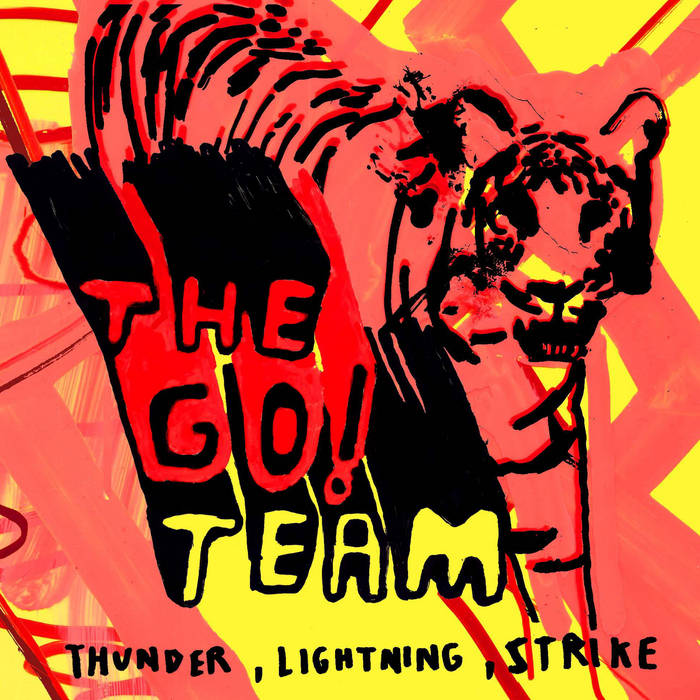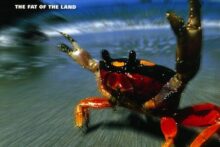The Go! Team are my happy place. If ever I need a sudden mood boost, I need only reach for ‘Huddle Formation’, a blast of which has the equivalent effect of a bull-semen-sized syringe full of dopamine jabbed straight into my heart, like Mia Wallace being revived with adrenalin in Pulp Fiction. The album from which it came, Thunder, Lightning, Strike – 20 years old this month – was one of a handful I carried everywhere with me on my travels in the physical format days of the mid-2000s.
Full disclosure: I first heard The Go! Team in the East London living room of The Quietus’ co-founder John Doran, whom I had befriended during a stint on the initially promising but ultimately disastrous music magazine BANG! John stuck on the 12 inch single of their third single ‘Ladyflash’, on a hunch that I’d like it. He couldn’t have been more on-the-money. It enthralled me instantly.
‘Ladyflash’ was a mid-paced, lusciously creamy confection made from a dozen disparate elements, most prominently a sample of Carol Kay’s Northern Soul beauty ‘This Time You’re Wrong’ (good luck picking up an original of that, by the way – there’s one copy on Discogs and it’s $197), and a rap by Sweet Tee & Leonie J from Davy DMX’s ‘The DMX Will Rock’. There was something gleefully incongruous about a band with a clear indie pop sensibility declaring (albeit via someone else’s voice) that “we came here to rock the microphone”. The feel reminded me somewhat of early Saint Etienne, but something about it seemed to chime with a more contemporary context.
The years 2001-2004 were the high water mark of mash-up culture. For a couple of years, you couldn’t go to a club night in London, New York or Berlin without hearing bootlegs such as Human League/TLC’s ‘Being Scrubbed’ by Girls On Top; Richard Philips, aka Richard X, and his Adina Howard/Tubeway Army collision ‘We Don’t Give A Damn About Our Friends’; or the Aguilera/Strokes juxtaposition ‘A Stroke Of Genie-us’ by Freelance Hellraiser (Roy Kerr). Or, if you went to Erol Alkan’s hugely influential Monday nighter Trash, the Missy-based mash-ups ‘Is There A Cure For The One Minute Man?’ and ‘George Gets His Freak On’ by Kurtis Rush (an alias of Alkan himself). Then, if you wound up at someone’s house for an all-back-to-mine, you could guarantee someone would stick on As Heard On Radio Soulwax Vol.2, the era-defining mixtape by Belgian brothers 2 Many DJs. Or, if something a bit more chilled was needed, the sampladelic Since I Left You by Australia’s The Avalanches.
Avalanches and 2 Many DJs aside, these club-friendly works of unlicensed mischief were originally hard to come by commercially, unless you knew which specialist dance music shops had a ‘Bootlegs’ divider in a shady corner. Before long, however, mash-up culture went overground. Richard X gatecrashed the mainstream by recreating the Howard/Numan idea with Sugababes on their chart-topping ‘Freak Like Me’ and re-using the ‘Being Boiled’ sample on a Top 3 hit with Liberty X, as well as releasing his own superb album, Richard X Presents His X-Factor Vol.1. Kurtis Rush’s Kylie/New Order mash-up ‘Can’t Get Blue Monday Out Of My Head’ was even performed by Minogue at the 2002 Brit Awards and given an official release.
Meanwhile, down in Brighton, Ian Parton of The Go! Team was quietly carrying out his own contribution to cut-and-paste culture on a laptop, working on a rudimentary version of his debut album to burn onto a CDR which won him a record deal. (This warts-and-all CDR is a bonus element on the anniversary reissue. The pitchshifting is wayward at times, and some tracks were ditched by the time the finished product came out, although elements of the original ‘Grip Like A Vice’, as opposed to the 2007 single of the same name, would resurface in ‘Titanic Vandalism’ on second album Proof Of Youth, and ‘Phantom Broadcast’ was given to the War Child charity for the 2005 compilation Help: A Day In The Life.)
Viewed through a certain prism, Thunder, Lightning, Strike – originally released in September 2004 by Memphis Industries, a North London indie previously known for Blue States, Theoretical Girl and Field Music – stands as one of a trio of towering monuments to that early Noughties mash-up moment, alongside the discs by 2 Many DJs and The Avalanches. However, when I call him up for a quick chat to clear up the timeline and the facts, Ian Parton tells me that he believes the sample element of The Go! Team’s work is overstated, and is keen to stress their own melodicism, and the way in which changing the root note completely recontextualises any given sample, lending it a different mood and meaning.
In fairness, he has a strong case. After all, the first Go! Team single, the limited-edition Get It Together EP, was released on Pickled Egg records in 2000 ahead of the mash-up craze, its instrumental lead track (which resurfaced on Thunder, Lightning, Strike) consisting primarily of a children’s recorder with some free-and-easy guitar, plus just a couple of unobtrusive samples from Beastie Boys’ Licensed To Ill album.
Furthermore, when The Go! Team did use samples, it wasn’t in the typical crude mash-up manner of laying one highly recognisable song on top of another. Their approach had more in common with much earlier albums like the Beasties’ Paul’s Boutique, Saint Etienne’s Foxbase Alpha and Public Enemy’s It Takes A Nation Of Millions To Hold Us Back (the types of records which essentially became impossible after the landmark Gilbert O’Sullivan vs Biz Markie case of 1991, ending the Wild West sampling free-for-all which had prevailed up until that point), using multiple elements to create an impressionistic sound-collage. Parton’s first attempt at recording Thunder, Lightning, Strike was conducted, he admits, in the belief that it was too small-time a project for anyone to bother coming for him waving legal papers. But we’ll come to that.
Parton also argues that it is the drums, not the samples, that are the unifying sonic thread through the album. Here, again, he has a point. Parton’s first recordings were as a drummer with the indie band Slot Jockey, fronted by his brother Gareth (eventual mixer of The Go! Team’s debut) and also featuring Paul Cooksey on bass (credited with coming up with the riff for The Go! Team’s ‘Panther Dash’), who released one split single with The Scaramanga Six in 1997. And the drums were vital to Thunder, Lightning, Strike version 1.0. In early 2004, taking time off from his day job making documentaries, Parton decamped to his parents’ home on Mayals Road in the Mumbles district of Swansea – immortalised as Jan & Ed’s Basement on the sleeve – armed with an Akai S1000 (the classic sampler first launched in 1988), a pocket calculator to figure out the time stretching, a reel-to-reel tape machine and a full drum kit which he set up in the kitchen, with everything else in the basement. (Ian literally had to press Record down below and run upstairs to the drum stool.) The harsh edges, the distortion and what he calls the “clatteryness” of the drums all make far more sense when you know that they were recorded in a room full of pots, pans, plates and cutlery.
The sources of Parton’s samples, meanwhile, were rooted in the dusty analogue world of charity shops. His diligent crate-digging unearthed novelty discs about skateboarding, semi-obscure cover versions of well-known songs, girl group rarities and, crucially, Northern Soul. (There’s a fascinating nexus between indie pop and Northern Soul. You can locate it in Spearmint’s ‘Sweeping The Nation’, in Edwyn Collins’ ‘A Girl Like You’, in the video to the aforementioned Saint Etienne’s ‘Nothing Can Stop Us’, and in the playlists of clubs like Track & Field and How Does It Feel To Be Loved. And if there were any remaining doubt that The Go! Team have a foot in the indie pop camp, it ought to vanish when you learn that a limited run of the anniversary reissue includes a double-sided seven inch on which TGT’s ‘Hold Yr Terror Close’ is covered by The Pastels and The Orielles.)
VHS tapes also played a huge role, whether it was pioneering hip hop movie Wild Style, the musical Hair, Neil Diamond’s The Jazz Singer (purely for a police siren), a documentary about the Black Panthers or cheerleader comedy Gimme An F. “I thought of it like a gang thing,” says Parton of the album’s prominent use of cheerleader chants, “a Riot Grrl thing”. Even though it was released before I made the city my home, Thunder, Lightning, Strike felt like a very Brighton record: eclectic without being mindlessly so, curating the good stuff from the past with a Modernist eye. For Ian Parton, however, it’s a New York thing. “I’ve always thought New York encapsulates everything I’m into. Sonic Youth, Sesame Street, Woody Allen, The Velvet Underground…”
This unique NYC-via-BN1 aesthetic began to turn heads and gain followers with each successive Go! Team release: 2003 single ‘Junior Kickstart’ (they’ve always had the greatest song titles) then 2004’s ‘The Power Is On’ and ‘Ladyflash’, and the album itself, whose reputation grew to the point that it received a nomination for the Mercury Prize. In order to tour it, Parton – essentially a one man band until this point – assembled a full group around himself, including rapper and singer Ninja (born Nkechi Ka Egenamba), a phenomenal meeting. Ninja brought vital charisma and flesh-and-blood cheerleader energy to The Go! Team’s basement-born sound, and the band rapidly became a major hit on the festival circuit.
Thunder, Lightning, Strike, however, became a victim of its own success, and Parton’s fast-and-loose approach to sampling on those original basement tapes came back to bite him in the backside. When the album was licensed out to Sony BMG, the corporation’s bigwigs took a dim view of Parton’s artful copyright infringement. “Aesthetically, morally, I don’t have a problem with it (sampling)”, he says now, but admits he “didn’t have a concept of major label territory” and didn’t foresee it ever becoming an issue. One option was to “throw money at it” and pay for every sample but, he points out, “If there are ten samples on a track, and they want 10% each, you end up making no money”. Instead, they went down what he calls the “the horrible route of sample recreation”, working with a musicologist to re-record or write around the samples, changing things just enough for said boffin to nod “OK, that’s clear, that’s a new idea”.
Attempts were also made by the major to smooth out the clashing, jarring dissonance between the samples, and Parton was offered new interpolations that “all sounded like ringtones” and all sounded like they came from the same place and time as each other. He held firm, insisting that the whole point of Thunder, Lightning, Strike was to was crash eras together, “all the good shit across different decades”.
The partially re-recorded version came out in 2005 (and it is this version which is being reissued). One way to tell which version of Thunder, Lightning, Strike you’re listening to – apart from the fact that version 2.0 has two extra tracks – is to skip straight to ‘Huddle Formation’. If it’s the original, the chorus runs “Standing on the board/ The board is on the wheels/ Wheels are on the ground/ Zoomin’ round and round” (a sample from a 1965 skatesploitation single by Norma Tracey, The Cinderella Kids and JJ Big). If it’s the second release, it runs “Banging on the door/ Cos we can’t hear a thing/ Keep shutting down the power/ Cos we can always sing” (written by Ninja, but actually recorded by session vocalists because the band were on tour in America at the time).
Ultimately, it doesn’t matter which of the almost indistinguishable incarnations you’re listening to: the sample-piracy one or the legal workaround one. Bringing all those unlikely building blocks together, whether they’re OG audio or once-removed facsimiles, is where it’s at: in Parton’s words, “Worlds colliding: that’s where the gold is.” And Thunder, Lightning, Strike is a work of inspired feelgood alchemy.





